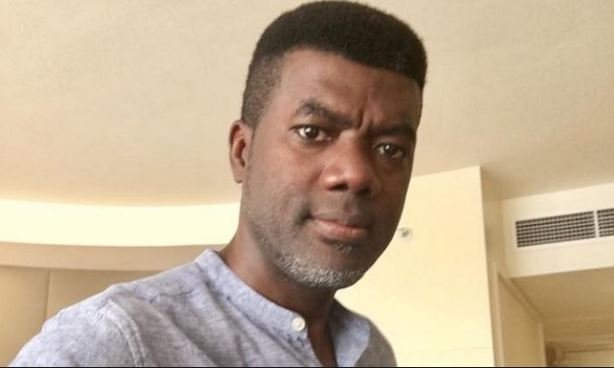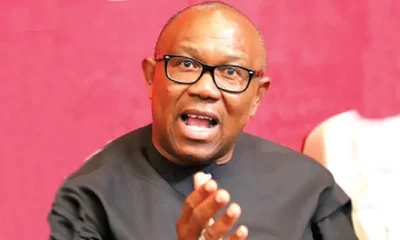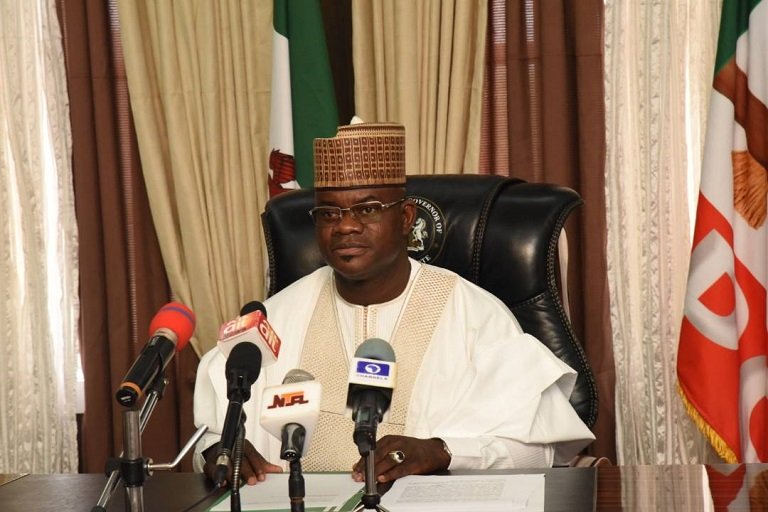Headlines News
LEAKED: How Babachir Lawal got tangled in IDP aid scandal

* Nigerian Senate report on aid calls for criminal investigation
* Senior official identified as central to alleged corruption
* Babachir Lawal denies wrongdoing, says victim of witch-hunt
* Effects of some aid work done in northeast were shortlived
By Alexis Akwagyiram and Paul Carsten
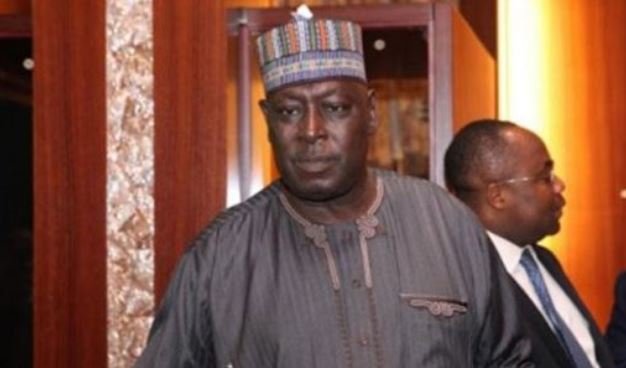
Babachir Lawal has been accused of fraud by the Nigerian senate
When millions of people in northeast Nigeria faced hunger and attacks by Islamist militant group Boko Haram in March 2016, the government acted: it decided to spend $1.4 million cutting down weeds around the village of Wachakal in order to stop flooding.
Six months later, many of the weeds had grown back and 317 million naira (at the time $1.04 million) had been transferred from the company hired to destroy them to a firm founded by the government official in charge of dispensing aid, according to a Nigerian Senate report.
The report, written by a committee of lawmakers from Nigeria’s upper chamber of parliament, concluded that companies that received contracts for projects including the weeding from a government body overseen by the official, Babachir Lawal, transferred a total of 500 million naira (worth around $2.2 million) to the firm he set up.
The report publicly called for a criminal investigation into the payments.
Central to the probe was whether Lawal was involved in a suspected kickback scheme to divert aid money intended for the volatile northeast.
The committee said the scheme involved inflating the value of contracts to enrich Lawal and his associates. The report did not provide evidence to show why it believed costs had been enlarged.
Lawal, 62, is an ally of President Muhammadu Buhari and one of his first appointments. In a written statement responding to Reuters’ questions, Lawal denied wrongdoing and said he had been the victim of a Senate witch-hunt.
The United Nations has warned that northeast Nigeria is gripped by one of the world’s worst humanitarian crises.
Boko Haram has burned down homes, destroyed livelihoods and killed thousands of people.
READ: SERAP asks Saraki to confirm N3bn yearly earnings of Nigerian senators
Refugees living in camps complain of starvation and disease, while soldiers and police have been accused of rape.
A Reuters review of the Senate report’s findings shows how two pillars of Buhari’s presidency – restoring stability in the northeast and fighting corruption – may have been undermined by the alleged misappropriation of aid money and food.

FILE PHOTO: An IDP camp in Dikwa, Borno, Northeast Nigeria
The review draws upon documents detailing bank transfers and corporate records, visits to aid projects and interviews with senior politicians, diplomats and humanitarian workers.
PROMISES UNFULFILLED
The final Senate report, published in May, recommended that Lawal be prosecuted for allegedly flouting procurement rules and breaking his oaths of office.
He was suspended in April pending a presidential investigation launched after the Senate’s findings first surfaced in an earlier draft of the report.
The investigation into Lawal, ordered by Buhari, was headed by Vice President Yemi Osinbajo, who delivered his findings to the president on Aug. 22.
“The president has to look at the report, study it and then make his own decisions,” Osinbajo said, without saying what was in the presidential investigation report.
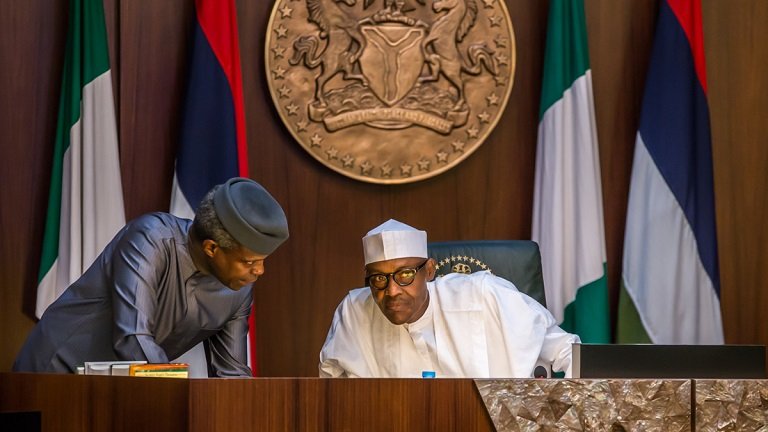
Vice President Yemi Osinbajo delivered findings to President Buhari
Buhari’s office referred Reuters to the vice president’s comments.
Despite Buhari’s vows to fight corruption, no major figures have been convicted so far. Boko Haram, who have killed around 20,000 people since 2009, have been pushed back in some areas yet continue to launch attacks, while millions of people in the northeast rely on some form of aid.
MILLIONS OF DOLLARS
Shehu Sani, who chaired the Senate committee that produced the report, said overall losses to suspected corruption in various forms in the northeastern humanitarian crisis in recent years had not been determined due to the probe’s specific remit and factors that restricted its scope.
He said the Senate investigation was limited by the timeframe examined, as it focused on government aid spending since the current administration took office in May, 2015.
Sani also said some government agencies had refused to cooperate, access to bank account details was limited and the use of international donor funds was not investigated.
“We can say, conservatively, that over 10 billion naira ($33 million) of monies that were supposed to go to the IDPs (internally displaced persons) were misappropriated or unaccounted for, or misused from different segments of the Nigerian government,” Sani told Reuters.
He said he was referring to all forms of corruption related to funds involving Nigerian humanitarian aid dating back around three years, and not just allegations involving Lawal. He declined to elaborate further.
The humanitarian crisis began in 2014. Nigeria’s then-president, Goodluck Jonathan, set up the Presidential Initiative on the Northeast (PINE) to provide emergency assistance to communities and foster economic growth in the region.
PINE had problems from the outset.
According to a 2014 internal PINE presentation prepared by the then-chairman for the group’s committee, a pilot scheme sent 51 food trucks to Borno state and 10 to Gombe state; none arrived.
After he became president in 2015, Buhari made Lawal Secretary to the Government of the Federation (SGF) – Nigeria’s top civil servant. Through PINE, Lawal oversaw millions of dollars of aid.
The Senate report alleges that most aid contracts in 2016 did not help the needy. Instead, inflated contracts “were awarded to companies belonging to top government officials’ cronies and close associates”.
It said a company called Rholavision Engineering Limited, which describes itself as “Information and Communication Technology Engineers & Consultants” and was founded by Lawal in 1990, was where money for companies that were awarded contracts by PINE came to first.
In his statement, Lawal said he relinquished ties with Rholavision on August 27, 2015, four days before being sworn in as SGF.
But company registry records show he did not resign as a director until Sept. 8, 2016. In addition, a signed letter from Lawal to the Corporate Affairs Commission (CAC) dated September 16, 2016 – contained in the appendices of the Senate report – said he wished to relinquish his shares in Rholavision.
“That can’t be true,” said Lawal in a text message when asked about the apparent discrepancy.
“This is forged,” he said, when sent a picture of the letter to CAC.
He declined to elaborate.
Rholavision declined to comment.
SOME WORK DONE
In March and August 2016, PINE awarded two contracts to cut weeds and improve irrigation in riverside communities in the northeastern state of Yobe. For some 30 years, the weeds had caused farmland to flood and prevented people from fishing.
The contracts, worth a combined total of 531 million naira, were granted to Josmon Technologies Ltd. The first contract, awarded in March 2016, was for 273 million naira – at the time worth $1.4 million.
The second contract was awarded to Josmon in August 2016. Nigeria’s naira currency lost around a third of its value two months earlier, so the 258 million naira contract was then worth some $845,000.
Rholavision, the company founded by Lawal, received a contract for a consultancy role in the weed-cutting project. The 7.1 million naira contract was awarded in March 2016 when that sum was equivalent to $36,040.
Some work was done. Ali Dodo, a farmer in Wachakal, told Reuters that he and others cut weeds around the Komadugu-Yobe river over a month-long period from August 2016. He said contractors paid them 2,500 naira a day.
Reuters was unable to determine how much was spent on the work in total. Bank records, however, show that Josmon Technologies paid 317 million naira to Rholavision between March and September 2016.
Monday John Apeh, a Josmon director, told Reuters that “Josmon has no relationship with Mr Babachir Lawal”.
In a text message, he said Josmon struggled to finance the PINE contract because the company had been experiencing financial difficulties and would only be paid when the work was complete. That “led us to borrow money from Rholavision’s MD”, he said.
Josmon said 195 million naira ($637,359) of the 317 million naira it sent to Rholavision was to repay that loan. Apeh declined to comment on what happened to the remaining 122 million naira.
Lawal said in his statement: “These purely business transactions between the companies cannot be classified as bribes.”
Dodo, the local farmer, said weeds started growing back within six months.
Despite numerous setbacks, Nigeria’s government is trying to reboot aid efforts. Buhari replaced PINE with the Presidential Committee on the Northeast Initiative last October.
In June, the government promised to distribute 30,000 tonnes of grain to people displaced by Boko Haram, after saying more than half of food aid previously dispatched had gone missing.
Zainab Ahmed, who heads Nigeria’s Inter-Ministerial Task Force on the Humanitarian Response in the Northeast, told Reuters the deliveries would now be guarded by soldiers.


